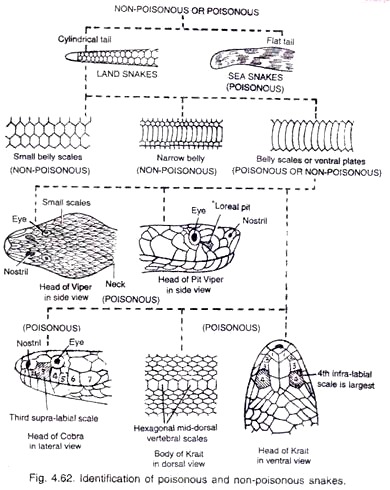ADVERTISEMENTS:
The following nine points will help you to identify the difference between non-poisonous and poisonous snakes.
1. If the small scales are present on the belly and back, it is a non-poisonous snake.
2. If the belly scales are not broad enough to extend right across it, it is a non-poisonous snake.
ADVERTISEMENTS:
3. If broad plates cover the entire width of the belly, it is poisonous or non-poisonous.
4. If small scales are present on the head, it is poisonous and a viper.
5. If small scales or shields are present on the head and a pit lies between the eye and the nostril, it is poisonous and a pit-viper.
6. If dorsal side of the head has both small scales and large shields, the snake may or may not be poisonous.
ADVERTISEMENTS:
7. If the third supra labial scale touches the eye and the nostril, the snake is a cobra or a coral snake. If the neck is with hood and markings, it is cobra. If neck is without hood and coral spots are present on the belly, it is a coral snake. Both cobra and coral snakes are poisonous.
8. If vertebral (scales on the middle of the back) are hexagonal and larger than other scales over the back and the fourth infra-labial scale is the largest, it is poisonous and a krait.
9. If the snake has small scales and large shields on the head but does not have the characters of cobra, coral-snake or krait, then it is non poisonous.

